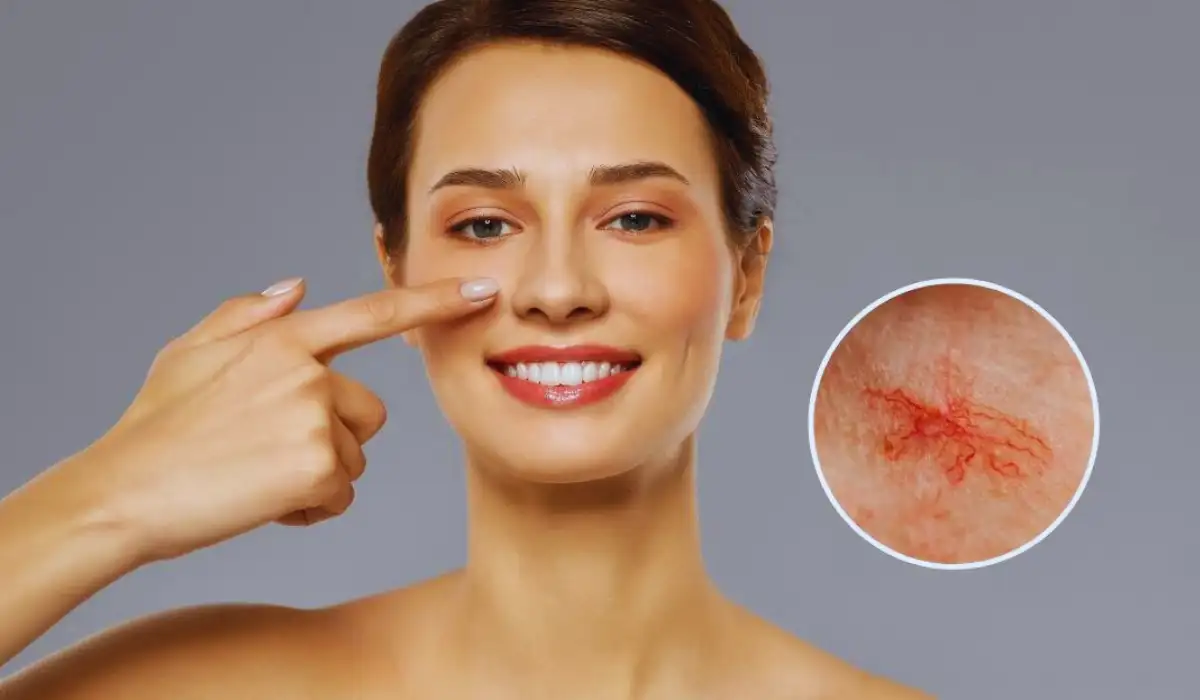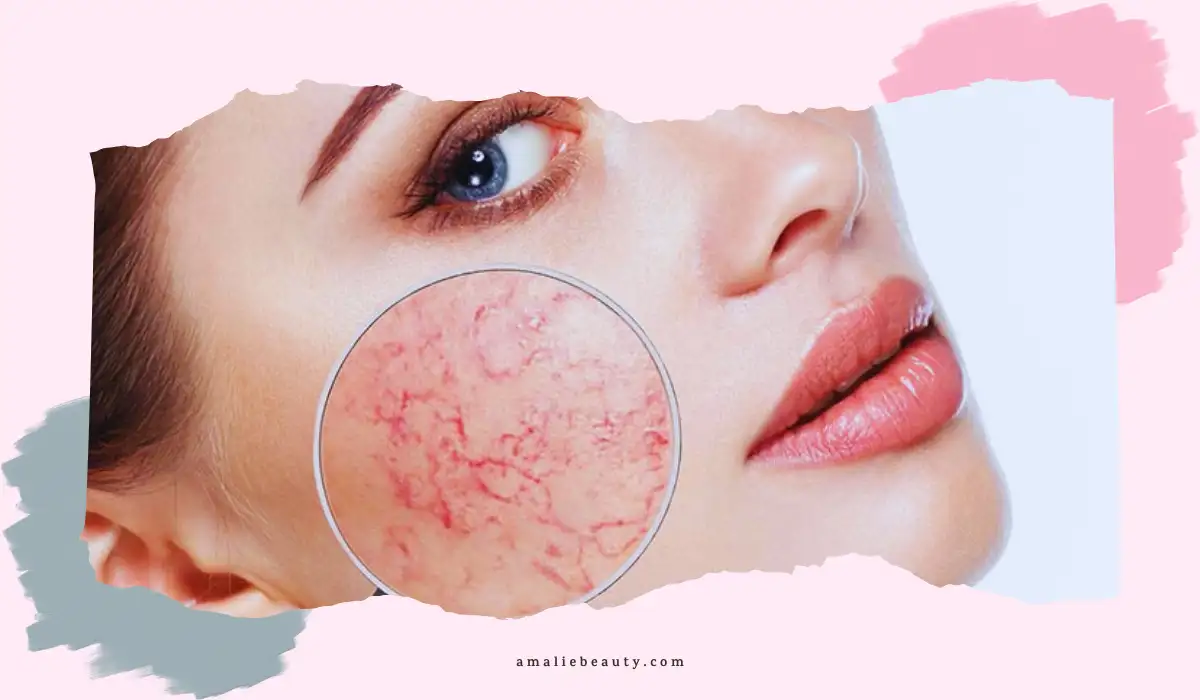You wake up one morning, look in the mirror, and gasp. Those tiny red lines on your cheeks and nose seem to have multiplied overnight! Broken capillaries on the face can appear suddenly and be quite upsetting.
I know how disheartening it can feel to see these delicate blood vessels burst under your skin. But don’t despair, my friend. In this lighthearted article, we’ll explore important details regarding broken capillaries like,
Broken capillaries on the face cause
How to prevent more broken capillaries on the face from forming
Broken capillaries on face treatment
Consider me your buddy who wants to help you resolve this pesky skin issue once and for all! With some effort and lifestyle adjustments on your part, maintaining a clear complexion is absolutely possible.
What Are The Causes Of Broken Capillaries on the Face?

Before we dive into solutions, it’s important to understand what leads to broken capillaries on the face in the first place. Knowing the culprits will help you avoid behaviors that promote them.
The fragile nature of capillaries under our facial skin makes them prone to damage. Common broken capillaries on the face causes include,
- Extreme temperature changes, both heat and cold. Think hot tubs or icy winter winds. Be gentle with your skin!
- Intense emotions like crying, yelling, and even laughing hard. Take a deep breath next time you get the giggles!
- Excessive sun exposure. We all love a sunny day but don’t forget your SPF!
- Severe skin issues like cystic acne or rosacea. Consult your dermatologist for treatment plans.
- Aging. Those pesky lines and wrinkles also weaken blood vessels. But hey, embrace getting wiser!
See, broken capillaries happen due to trauma to the face. Now that you know why they occur, avoiding these triggers will be a helpful first step.
Broken Capillaries on Face Treatment
If you already have visible broken capillaries on your face, shill out. A variety of clinical treatments can help minimize their appearance. Discuss options with your doctor like,
- Laser Therapy: Using pulsed dye lasers to improve skin texture.
- Intense Pulsed Light (IPL): A broad spectrum light that targets blood vessels.
- Micro-Sclerotherapy: Directly injecting damaged vessels with a special solution.
All these broken capillaries on the face treatment work by directing concentrated energy toward red skin imperfections. This stimulates collagen production for smoother skin and shrinks dilated capillaries. Most patients see results after 3 to 5 careful sessions.
The downsides of these broken capillaries on face treatment are possible mild pain during procedures and several weeks of healing. Still, lasers and injections provide very effective correction for visible broken capillaries. Just be sure to use a qualified technician.
How to Treat Broken Capillaries on the Face Using Home Remedies?
Perhaps you want to improve the look of broken capillaries but are hesitant about intensive clinical methods. Not to worry.
I’ll give you points on how to treat broken capillaries on the face using home remedies. While likely not as dramatic, home remedies come with virtually no pain or downtime,
- Apply witch hazel, Its antioxidants and tannins constrict blood flow.
- Dab apple cider vinegar, Malic, and lactic acids diminish redness.
- Use topical vitamin K cream, It assists with blood coagulation.
- Drink bioflavonoids like pine bark extract or grape seed. They strengthen veins.
- Massage gently with a cold jade roller. It reduces inflammation.
- Spot treat with lemon juice. Natural astringent and acid exfoliant.
Be patient in assessing home remedy results as visible change develops gradually. However, implementing a few of these methods could make a difference without professional intervention. Why not try? At the very least, you’ll look fancy with a gemstone facial roller!
Strategies to Prevent Future Broken Capillaries on the Face
Now that you grasp why those pesky broken capillaries appear, we can prevent more from forming with some easy lifestyle adjustments. I’ll share my top five precautions here,
- Wear SPF daily, rain or shine. Sun protection is crucial year-round to skin health. Reapply every two hours of exposure.
- Handle skin gently. Treat your face with care – no harsh scrubs or steamy showers. Pat dry, don’t rub!
- Maintain an effective skincare regimen that keeps your skin’s moisture barrier strong. Consult an esthetician if unsure what products are best for your skin type.
- Eat antioxidant and vitamin C-rich foods like citrus fruits, leafy greens, berries, and tomatoes. A healthy diet supports healthy skin.
- Manage stress levels through yoga, meditation, journaling, whatever works for you! Cortisol is the enemy of clear skin.
Remember, broken capillaries on the face get formed when the facial area gets irritated. By nurturing your skin and avoiding triggers, you give those delicate blood vessels their best shot at staying intact. Make these tips part of your daily self-care routine for gorgeous, glowing skin!
Conclusion
In conclusion, dealing with broken capillaries may feel discouraging. But solutions do exist! Now that you understand why those unsightly little red lines appear, avoiding triggers becomes KEY.
Handle your facial skin with care, treat it gently, and protect it diligently. Discuss professional treatment options with your dermatologist if many broken blood vessels already exist. Or try beneficial home remedies first to see if they make a difference.
Most importantly, set yourself up for success by implementing a complete skincare regimen focused on protection and nourishment. You CAN minimize future broken capillaries! Make prevention a priority every single morning. Your skin will thank you.
Here’s the bottom line – don’t panic over a few visible broken capillaries. And definitely don’t pick at them! Embrace them as motivation to adjust your lifestyle habits accordingly. Take action to nourish and safeguard your skin’s health. With time and diligent care, you can outsmart those pesky red spots.
Now tell me friend – what proactive steps will you take starting today to prevent new broken capillaries from surfacing? I can’t wait to hear your game plan!
References
- What does melanoma look like? (2011).
https://www.cancer.gov/types/skin/melanoma-photos - Acne. (2016).
https://medlineplus.gov/acne.html

